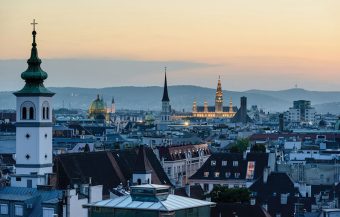Climate change indeed requires a collective effort, and we all have a role to play in reducing our impact on the environment. Vienna is one of the leading European cities in environmental protection and climate policy. The city is known for its ambitious plans for sustainable development, including energy, transportation, and waste management changes.
Vienna is focusing on transitioning to renewable energy sources, improving building energy efficiency, developing public transport and bicycle lanes, and implementing green initiatives such as urban parks and green roofs. Public enterprises play a crucial role in this process, each contributing in its way to the shared goal.
Green Energy for All
Vienna’s citizens can participate in the energy transition and the expansion of renewable energy sources through the solar power plants operated by Wien Energie, thereby contributing to a sustainable energy future without the need to install their own solar panels. The model works in a simple way. Wien Energie builds and operates solar plants, and customers can participate symbolically in the project by purchasing solar packages. The price of one solar package was last set at 250 euros. Participants receive vouchers over five years for the energy produced, which they can use, for example, against their annual electricity bill settlement. The amount of compensation in vouchers depends on the amount of energy produced, and participants can monitor the production in real-time via an online dashboard. Nevertheless, a minimum annual production is guaranteed to ensure that users benefit. This offer has been very well received; 30 such power plants have been built to date, and more than 12,000 households have participated in these projects.
The solar power plant contingent, launched in spring 2024 on the roof of a bus garage, sold out within one day.
IN FOCUS:
- K2 WallPV – the System Solution for Solar Projects on Building Facades
- Sustainability Starts on the Roof
- From Key Projects To Future Strategies
Energy and Climate Transition
With a bus powered by a combination of batteries and hydrogen, Vienna’s public transport company, Wiener Linien, continues its commitment to new, environmentally friendly technologies. In February this year, a new competence center for electromobility was opened, and six bus lines have already fully transitioned to electric power. The plan is for nine bus lines to switch to electric power by the end of 2025. In addition to new small buses with range extender technology, hydrogen-only buses will be introduced in 2025. Ten 12-meter buses, adapted for people with disabilities and reduced mobility, will in the future be refueled with hydrogen at stations operated by Wien Energie and Wiener Netze.
To achieve climate neutrality and adapt to climate change, the Climate Department was established in Vienna. It manages strategic climate policies, the implementation of the Vienna Climate Strategy, and the Vienna Climate Budget. Jürgen Czernohorszky, a member of the Vienna City Government Council for Climate, Environment, Democracy, and Personnel, explained how they are realizing their ideas.

“The energy and climate transition concerns all of us and can only succeed through collective efforts. We must work together to make Vienna climate-neutral and maintain its high quality of life. We are setting strategic initiatives that raise awareness of a holistic culture of a climate-neutral, resilient, and circular city. Only through joint efforts can the city achieve its ambitious climate goals. We openly address challenges, engage with citizens, and offer targeted education on climate change for both young and old. Climate change education explains cause-and-effect relationships and shows how the climate transition can succeed. Through the Vienna Climate Team, we have enabled citizens to present their ideas for a better climate in their neighborhoods and implement them with city experts. A representative group of residents in each district decides which projects will be implemented with the available financial resources. We also work closely with NGOs and local multipliers to create synergies and learn from each other,” says Mr Czernohorszky.
Vienna’s climate plan includes measures in areas such as mobility, energy, the circular economy, and public services. As our interviewee highlights, Vienna advocates for socially just climate protection that leaves no one behind.
“Vienna’s Heating Plan for 2040, published in May, offers, for the first time, a concrete target showing how the heating supply for buildings could look without the use of fossil fuels by 2040. The plan considers the entire building stock in the city, indicating where district heating could be expanded (which will be fully climate-neutral by 2040) and where other solutions will be needed. In Vienna, great importance is placed on the exemplary role of the public sector, especially in renovating public buildings,” explains Mr Czernohorszky.
Prepared by Jasna Dragojević
The story was published in the new issue of the Energy portal Magazine ENERGY TRANSITION

